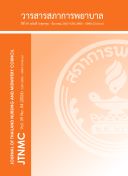Effects of the Nutrition Promotion Program on Health Behaviors and Hematocrit in Pregnant Women with Anemia
DOI:
https://doi.org/10.60099/jtnmc.v39i04.269625Keywords:
health behaviors, food consumption behavior, iron supplement consumption behavior, hematocrit, pregnant women, anemia, nutrition promotion programAbstract
Introduction Anemia is caused by abnormalities in red blood cell production, often resulting from iron deficiency, which decreases both red blood cell count and hemoglobin synthesis. This can cause symptoms including fatigue, lack of energy, difficulty performing activities, and reduced ability to work. Without proper management, anemia can adversely affect the health of both mothers and their fetus.
Objective To compare the average health behaviors (food consumption behavior and iron supplement consumption behavior) and blood concentration levels in pregnant women with anemia, before and after participating in the program.
Design This study employed a quasi-experimental design with a one-group, pre-test, and post-test design.
Methodology The participants were 30 pregnant women with anemia who received care at the antenatal clinic of a community hospital in Nakhon Si Thammarat province between January and March 2024. They were purposively selected according to inclusion criteria. The sample size was determined based on a literature review, using a test power of .80, a significance level of .05, and an effect size of 0.5. The research tools included: 1) a nutrition promotion program developed by the researchers, based on Pender’s health promotion theory, with content validity confirmed by experts, indicated by a content validity index (CVI) of 1.00, and 2) data collection tools including a general information questionnaire, a pregnancy-related questionnaire, and a food consumption and iron supplement consumption behavior questionnaire, developed by the researchers, with a CVI of 1.00 and reliability indicated by a Cronbach’s alpha coefficient of .84. Data were analyzed using descriptive statistics and Paired t-test.
Results On average, the participants were 30.10 years old (SD = 6.85). Most of them were multiparous (70%), with an average gestational age of 7-13 weeks for their first antenatal care visit. After participating in a nutrition promotion program, the participants showed higher health behaviors including food consumption behavior and iron supplement consumption behavior (M = 3.52, SD = 0.09) compared to before the program (M = 2.40, SD = 0.13) with statistical significance (t = 37.214, p < .001). Hematocrit (M = 34.33, SD = 2.09) was also higher than before the program (M = 31.17, SD = 1.56) with statistical significance (t = -9.185, p = .001).
Recommendation Nurse midwives working in the antenatal care department can use the program for pregnant women with characteristics similar to those of the study participants to promote proper food consumption and iron supplement consumption behaviors.
Downloads
References
Koranantakul O. Prediction and prevention of preterm birth. TJOG. 2019;28(1):8-15
Benoist BD, McLean E, Egli I, Cogswell M, editors. Worldwide prevalence of anaemia 1993–2005: WHO global database on anaemia [Internet]. Geneva: WHO Press; 2008 [cited 2023 Jul 9]. Available from: https://www.who.int/publications/i/item/9789241596657
Tana C, Wanapirak C. Anemia in pregnant women [Internet]. Chaingmai: updated 2017 8; [cited 2023 Feb 23]. Available from: https://w1.med.cmu.ac.th/obgyn/lecturestopics/topic-review/5679/
World Health Organization. Updated WHO Recommendation on Tranexamic Acid for the Treatment of Postpartum Hemorrhage [Internet]. [place unknown]: [publisher unknown]; 2017 [cited 2024 Feb 23]. Available from https://www.who.int/reproductivehealth/publications/tranexamic-acid-pph-treatment/en/
Chareonsanti J. Nursing and midwifery: women during pregnancy. Chiang Mai: Faculty of Nursing Chiang Mai University; 2017
Bureau of Nutrition, Department of Health, Ministry of Public Health. Guidelines for controlling and preventing anemia. [Internet]. Nonthaburi: Department of Health; 2020 [Accessed 2023 April 19] Accessible from https://nutrition2.anamai.moph.go.th/th/book/download/?did=213240&id= 104798&reload.)
Mir MK, Yousaf S, Yas AI, Tahir S. Maternal anemia is a risk factor for low birth weight babies at term. Pakistan J Med Heal Sci. 2016 Jul;10(3):741–743.
Rahmati S, Delpishe A, Azami M, Ahmadi MRH, Sayehmiri K. Maternal Anemia during pregnancy and infant low birth weight: A systematic review and Metaanalysis. Int J Reprod Biomed. 2017 Mar;15(3): 125-134.
Udaiy K, Jaiklaun J, Hansawong I, Phangsuwan P. Effect of maternal anemiaon low birth weightbabies at term in Phrae Hospital.PMJCH. July 2021;29(2): 88-101.
Tongsong T. Obstetrics. 6th ed. Chiang Mai: Department of Obstetrics and Gynaecology, Faculty of Medicine, Chiang Mai University. 2021.
Singdaeng T, Promtes P. Associated risk factors among anemia in pregnant women attending antenatal clinic in Nam Phong Hospital, Khon Kaen Province. EMH. 2023;8(2):101-109.
Chantanamongkol K. Nursing care for women with congenital diseases. Pathum Thani: Rangsit University; 2016.
Lamoh S, Youngwanichsetha S, Thitimapong B. The Effects of Nutrition Promotion Program on Food and Iron Supplement Consumption Behaviors and Hematocrit Among Teenage Pregnant Women with Anemia [Thesis]. Songkla: UniversityPrince of Songkla University; 2020.
Khampila W, Thitiyarnviroj B, Raksee S, Manadee P, Tubsai T, Singsiricharoenkul S. Caring for Pregnant Women with Iron Deficiency Anemia: The Challenging Role of Nurses. JFONUBUU. 2022 Apr; 2(30): 134-139.
Pender NJ, Murdaugh CL, Parsons MA. Health promotion in nursing practice. 6th ed. Boston: Pearson; 2011.
Danyuthasilpe C. Pender’s Health Promotion Model and Its Applications in Nursing Practice. Songklanagarind J Nurs. 2018 Apr; 2(38): 132-141.
Best JW. Research in Education. 3th ed. New Jersey: Prentice-Hall; 1977.
Phumesawat S, Suvithayasiri K, Chaisup V. Perceived benefits and health promoting behaviors in pregnant women at antenatal clinic of Rajavithi hospital. JBCN_Bangkok. 2013; 2(29): 80-94.
Karalai S, Sriratanaprapat J. Relationships between Social Support and Health Promoting Behavior among Pregnant Teenagers. JFONUBUU. 2018 Jan; 1(26):1-10.
Sulaiman P, Kala S, Thassri J. Effects of a Health Promotion Program Integrated with Islamic Law on Health - Promoting Behaviors of Muslims Pregnant Teenagers [Thesis]. Songkla: UniversityPrince of Songkla University; 2017.
Jaranai P, Nirattharadorn M, Buaboon N. The Effect of a Nutrition Promotion Program on the Nutritional Health Behavior and Hematocrit Levels of Adolescent Pregnant Women. CUNS. 2018;30(1):59-69.
Downloads
Published
How to Cite
Issue
Section
License
Copyright (c) 2024 The Journal of Thailand Nursing and Midwifery Council

This work is licensed under a Creative Commons Attribution-NonCommercial-NoDerivatives 4.0 International License.








